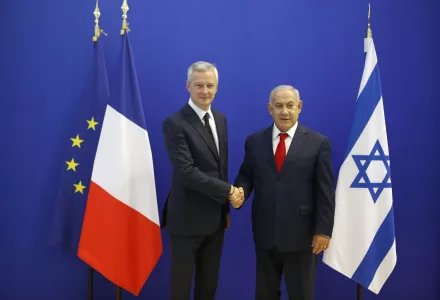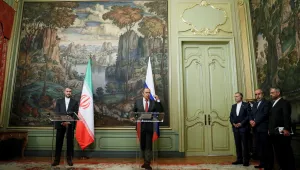
Note
A Hebrew-language version of the op-ed appeared in Haaretz on June 24, 2018. The translation was provided by the author.
More than a month after the U.S. withdrawal from the Iran nuclear deal, America's strategy for containing Iran's nuclear program and regional expansionism remains murky. Having worked tirelessly for the agreement's abrogation, this should be Israel's Prime Minister Benjamin Netanyahu’s finest hour.
But, in practice, the Trump administration does not appear to have a coherent strategy towards Iran and is now focused on North Korea. What may be even more worrisome is that Israel, too, does not appear to have a coherent and practical strategy.
In the coming weeks, opponents of the Iran nuclear deal will enjoy a brief period of satisfaction. The Europeans are rapidly discovering that their dependence on the U.S. market is such that they have little choice but to adhere to the new sanctions regime. Iran, too, finds itself boxed in, forced to continue sticking with the agreement, at least in the short term, in order to maintain its relations with Europe.
Within a matter of months, however, the Iranians' patience will likely wear out, and they will begin taking steps to disengage from the agreement. That is when the hour of crisis will arrive.
The question, as always, is: What are the alternatives?
Trump and Netanyahu have both stated that their primary objective is to force Iran into acceding to an improved agreement. The renewed sanctions are thus designed to exert extreme pressure on Iran and to force it to accede to what is, for all practical purposes, a dictate. In the absence of the comprehensive international sanctions regime that existed in the past, however, the probability that Iran will do so and make concessions today, that it was unwilling to make at the time, is low. Iran, too, has domestic politics and political leaders vying for stature and prestige.
Indeed, it is more likely that the outcome will be a strengthening of the hardliners, who argued from the beginning that the nuclear deal was no more than a case of American subterfuge, and that Iran’s aggressive behavior will increase, including in Syria.
A second option is a U.S. effort to forge a regional anti-Iranian alliance, based on the Gulf states, Egypt, and Jordan, with Israel's at least indirect involvement. Formation of an alliance of this sort would require an increase in U.S. arms sales, a strengthened U.S. military presence in the region, provision of some sort of U.S. security guarantee for the participating states and growing coordination between them and Israel. Having already expressed his desire to reduce U.S. forces in Syria, Trump will have a hard time convincing anyone of the seriousness of his willingness to now take on Iran.
A third possibility is that Trump and Netanyahu are really thinking in terms of regime change in Iran. This is a worthy objective in its own right, with one small problem: all of the attempts to foment regime change in Iran from the outside, ever since the Islamic revolution in 1979, have failed and no one knows how to do it today either. Change in Iran, if it comes, will probably have to come from within.
At some point in the near future, when it becomes clear that the sanctions and other options above are not producing the desired results, or when Iran restarts its nuclear activities, we may be left with just two more options.
One, is an American strike designed to destroy the Iranian nuclear program. Some experts, including some very senior and staunchly pro-Israel former U.S. officials, believe that Netanyahu's true objective is to bring about the circumstances that would require U.S. military action. The probability of Trump doing so, however, appears to be low. His flights of rhetoric, notwithstanding, Trump's true objective is to reduce U.S. involvement abroad. If he does act and the strike succeeds, this would be an historic achievement for Israel. If it does not, Israel will be accused of a further attempt to draw the United States into a failed military adventure in the region.
The second option is an Israeli military strike. Just a few years ago, however, Israel's entire senior military and intelligence leadership was opposed to this option. Are we prepared to carry it out now? Has American backing been assured and agreement reached on the measures to be adopted if Iran renews its nuclear program in response?
If we do not wish to reach the stage in which Israel has no choice but to attack — and we will not have any other choice if and when all other options have been exhausted — we must act wisely now, not through dictates, to bring Iran back to the table. Doing so begins with recognition of a harsh reality; that in the circumstances created by the irresponsible and reckless U.S. withdrawal from the nuclear agreement, Iranian acceptance of a new and "improved" agreement will be entirely contingent on its being improved for Iran, too. It will also be necessary to overcome what will now be justified Iranian concerns regarding the credibility of U.S. commitments.
In order to reach a new agreement, a complex division of labor between the major powers will be necessary. The United States (and Israel) will have to keep up the pressure on Iran, inter alia, by maintaining a credible threat of military attack. The Europeans will have to use their influence in order to ensure that Iran continues to adhere to the existing agreement, at least for the meantime, while making it clear that its violation by Iran will force them to support the hardline American position. Iran will accede to a new agreement, if at all, only under severe pressure.
Paradoxically, it is precisely in the heated atmosphere of the resulting international crisis, when Iran is on the verge of pulling out of the agreement and the conditions for a U.S. or Israeli strike have ostensibly emerged, that opportunities for creative diplomacy may emerge. It is difficult, of course, to foresee how events will play out, but Russia, the only major power that has relations with all sides and is leading player in Syria, may play a central role. There is a further possibility: that Trump, riding the waves of self-adulation following his success with North Korea, will try to reach a rapid and dangerous breakthrough with Iran, as well.
When the United States gives an adversary most of what it wants, without spelling out what it gets in return, or the means of supervision, it is not surprising that a "breakthrough" is reached. Indeed, Trump has already declared that the North Korea no longer poses a nuclear threat, even though not a single bomb has been dismantled. Israel must do its best to prevent a similar "success" with Iran.
If a different administration was in office in Washington, hawkish but responsible, and another premier was in office in Jerusalem, someone who is not fighting for his political future and even personal freedom, Trump's and Netanyahu's hardline approach might be appropriate. There is room for coercive diplomacy towards Iran.
In Washington, however, we have a president who is incapable of differentiating between personal desires and reality, and who turns his back on historic allies with wild abandon. In Jerusalem, the timeline for the legal proceedings against the premier may develop in tandem with the escalating situation with Iran. In these circumstances, betting on them is dangerous.
Statements and views expressed in this commentary are solely those of the author and do not imply endorsement by Harvard University, the Harvard Kennedy School, or the Belfer Center for Science and International Affairs.
Freilich, Chuck."Trump Has No Coherent Strategy on Iran. Astonishingly, Nor Does Israel." Belfer Center for Science and International Affairs, Harvard Kennedy School, June 26, 2018.





